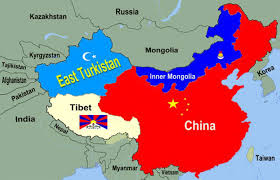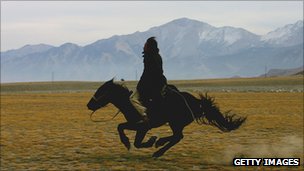People with large beards, headscarves, hijabs and other religious clothing have this month been banned from travelling on state buses in a city in China’s Xinjiang province, or East Turkestan. This ban is one of the latest imposed by the Chinese Government in their crackdown in the region, an area that has seen growing ethnic and religious tension in recent years between the Uyghurs, a Muslim minority group, and ethnic Chinese people.
The Uyghur homeland, East Turkestan, became known as Xinjiang [or “new territory”] when it was annexed by China in the 18th century. East Turkestan is a remote and resource-rich region and the Turkic speaking Uyghurs, who embraced Islam in AD 934, have played an important role in cultural exchanges between East and West. The Uyghurs are the 5th largest ethnic minority in China, with a population of around 9 million.
The Uyghurs often feature in Tibetan news as parallels can be drawn between the situations of the people in these two regions. Both regions are under Chinese Communist rule and claim serious human rights abuses in their provinces. The World Uyghur Congress (WUC) says, “We both face the threat of suppression of our religion, cultural extinction and large-scale Chinese migration into our homelands.” Both groups report they are subjected to routine surveillance, monitoring of their telephone and email communications, and that arrest, detainment and torture of citizens is common practice. Both Tibetans and Uyghurs accuse the Chinese of deliberately destroying their language, religion and culture.
In Xinjiang, state institutions and schools are banned from celebrating religious holidays, fasting, studying religious texts and wearing religious clothing, and people found to be practising their religion are regularly arrested and tortured. The local Turkic language is similarly discouraged, with Mandarin imposed as the official language.
As the only two Chinese provinces where Han Chinese people are in the minority, both Tibet and Xinjiang have seen a steady influx of Han Chinese in the past few decades. The Uyghur population of Xinjiang has dropped from 95% to 45% since 1949. Uyghurs, like Tibetans, say that migration has increased poverty and unemployment among their people. Unlike Han Chinese, Tibetans and Uyghurs do not enjoy freedom to travel and can often experience difficulties obtaining passports or making long distance travel.
Both regions share sympathy and understanding because of their shared circumstances. The WUC has expressed solidarity with the Tibetans and support for their peaceful protests. His Holiness the Dalai Lama has said “Let us remember the people of East Turkestan who have experienced great difficulties and increased oppression. I would like to express my solidarity and stand firmly with them.”
The reactions of Tibetans and Uyghurs to their circumstances could not be more different. Tibetans have usually protested against their lack of freedoms using peaceful means, whereas Uyghur protests have become increasingly violent and the riots which started in 2009 have led to a Chinese crackdown with an escalation of violence. Dolkum Isa, Executive Chairman of WUC says of the Chinese, “They show zero tolerance. That is why the violence is happening.”
As the crackdowns intensify, Tibetans have chosen a different outlet for their desperation. Most Tibetans are Buddhist and strong supporters of the Dalai Lama, who leads his people in non-violence. So Tibetans refrain from using violence against others, but to raise awareness, 130 people have turned to violence against themselves, self-immolation.
China has declared the World Uyghur Congress a terrorist organisation. The current WUC President, Rebiya Kadeer is in exile in the United States, showing another parallel with the Tibetans whose spiritual leader the Dalai Lama is in exile in India.
In both East Turkestan and Tibet people are struggling to assert their basic human rights and enjoy common freedoms. As the Chinese crackdowns intensify, both groups have been compelled towards more drastic means to get their voices heard, the Uyghurs with violence against the Han Chinese and the Tibetans with violence against themselves. Rebiya Kadeer, President of the WUC, says “Both Tibet and Xinjiang should have the right of self-determination. The Chinese authorities should listen to the demands of the Tibetans and Uighurs and should negotiate with the leaders of both Tibetans and Uighurs for the future of these two territories.”






 Print
Print Email
Email